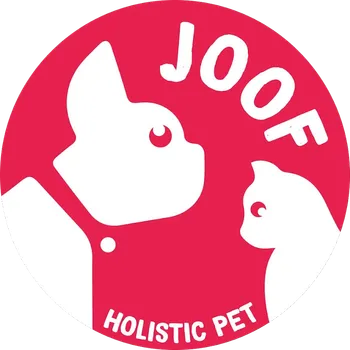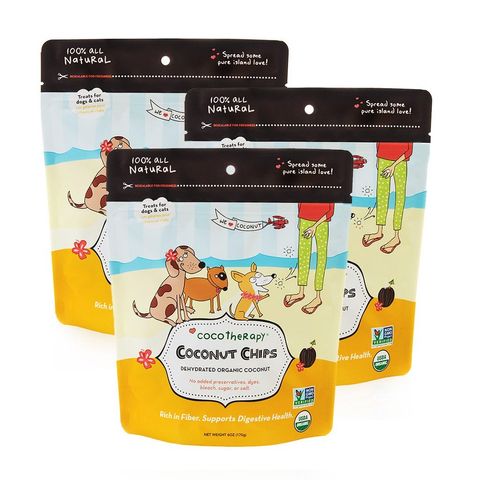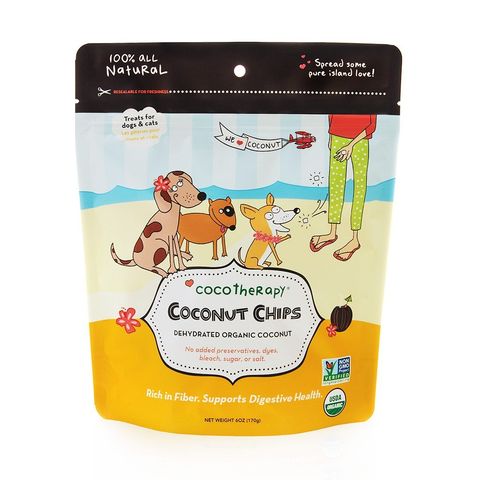
Recommended Article #25Mar25
Hi, Pet Parents Resources is a platform, where we share with you, what we research as pet parents ourselves. Here, we curate and give, what we hope would be, interesting to important informative articles, videos and even podcasts from our brand creators, experts, researchers, and more all over the world, to aid you in making better choices for your pets.
This recommended article "Why Do Pets Need Fiber in Their Diet?" is curated and sourced from CocoTherapy. If you loved this article, please do feel free to share it around.
Why Do Pets Need Fiber in Their Diet?
You may have noticed that dietary fiber is a common ingredient on pet food labels. But what exactly is it, and why is it an important part of your pet's diet?
Dietary fiber is a plant-based nutrient and a type of carbohydrate. It is resistant to digestive enzymes in the intestinal track, so it passes through the body relatively intact. Although dietary fiber has no direct nutritional value, it adds bulk and water in the intestinal contents and has an important role to play in supporting your pet's digestive system.
Dietary fiber in pet food comes from a variety of sources. Some of the most common include beet pulp, bran, psyllium husk, grain hulls, flaxseed, and coconut fiber.
In this post we'll take a closer look at the importance and function of dietary fiber. We'll also explain why coconut fiber is an excellent addition to your pet's diet, and a simple way to make sure your pet is getting enough fiber to support their health.
The Importance of Dietary Fiber
Fiber has several functions in the body. In this section of the post we'll look at some of the conditions it can help prevent, and its role in treating existing pet health problems.
Constipation
Because fiber increases water retention in the intestines and softens the stool, it is well established that fiber-rich diets can be used to manage constipation in pets. Fiber also adds bulk to the stool; this increases the propulsive movements of the intestine, helping to alleviate constipation.
Diarrhea
Amazingly enough, fiber can also help treat some diarrheas. Fiber normalizes intestinal transit time in diarrheic animals, increasing water absorption from the colon. This results in less water lost in the stool. For this reason, high-fiber diets have a place in the treatment of Colitis.
Colitis
Generally speaking, Colitis is defined as a medical condition that is characterized by the swelling of the large intestine, which is also called the colon. However, Colitis is a relatively general term for this condition, and can be caused by several different factors. Colitis is also called SBS (Spastic Bowel Syndrome), IBD (Inflammatory Bowel Disease), and AC (Acute Colitis). The most common symptoms of Colitis are constipation, diarrhea, and, in some cases, weight loss.
Though not all Colitis can be prevented, veterinarians generally agree that it's a fiber-responsive disease. Dietary fiber is a source of food for beneficial colon bacteria and provides nutrients for colon cells. That's why dietary fiber is essential for keeping your pet's digestive tract functioning normally.
Obesity
A diet rich in fiber can help manage your pet's weight and prevent obesity. Fiber adds bulk to your pet's food without adding calories. This results in a longer lasting feeling of satiety. Simply put, a fiber-rich diet can help your pet feel fuller for longer – and that means they're far less likely to overeat, gain weight, and become prone to obesity.
Diabetes
Dietary fiber helps regulate blood sugar levels in the body. For this reason it can reduce the risk of your pet developing diabetes. A high fiber diet is also a standard part of the treatment and management of diabetic pets.
Anal Gland Problems
Anal gland problems can be a big problem for dogs – and their owners! Dogs have two small glands, one on each side of the anus. These produce a fluid that marks your dog's unique scent when he defecates. Usually this is not a problem, as the fluid passes from the glands into your dog's stool. But if these glands become infected, they can produce a foul smell and cause pain and discomfort.
If your dog has ever had anal gland problems you'll know just how unpleasant the situation can be. Aside from the smell, signs that your dog is suffering from impacted anal glands include "scooting" (dragging their anal area across the floor), or excessive licking of the area.
Adding fiber to your dog's diet will bulk up the stool and put pressure on the anal glands. This helps them to function properly.
Benefits of Coconut Fiber
So far in this post, we've looked at the role of fiber in the body and some of the conditions it can help prevent and manage. In this section, we'll dive into the benefits of coconut fiber, and how to use it as a fiber source to supplement your pet's diet.
Coconut is an excellent source of dietary fiber that has anti-inflammatory properties due to its medium-chain fatty acids (MCFA). It can help soothe the digestive tract, and provide valuable support in controlling Colitis in pets.
The fiber in coconut acts as food for gut bacteria. It helps increase short-chain fatty acids (SCFA) in the gut and helps prevent and relieve symptoms associated with Crohn's disease, irritable bowel syndrome (IBS), Colitis, and other digestive disorders.
Short-chain fatty acids are fats that are synthesized from dietary fiber by intestinal bacteria. They are vital to the healthy functioning of your pet's colon and digestive system.
CocoTherapy Coconut Chips
CocoTherapy coconut chips are a rich source of dietary fiber. Adding them to your pet's food is a simple yet effective way to take advantage of the fantastic health benefits associated with a high fiber diet.
Our CocoTherapy Coconut Chips are made from dehydrated organic coconut meat. The dried coconut flakes are made of pure, 100% organic coconut meat, with absolutely NO sugars, salt, preservatives, or chemicals added.
Our organic coconut chips are raw and dehydrated slowly at a low temperature. This keeps the nutrients intact, resulting in raw coconut that tastes fresh, has a wonderful texture, and contains all the rich nutrients found in fresh coconuts.
And since our chips are 100% human-grade, they're great for pets and people! Bake with them, add them to your smoothies and cereal, or eat them right out of the bag as a wholesome snack. For your pets, give as a treat throughout the day, or mix into food as a fiber supplement.
The good news is, you can purchase CocoTherapy® Coconut Chips and other CocoTherapy products from our retailers today!
______________________________________________________________
You may find more interesting reads from JOOF Holistic Pet today! Look out for loads of information on our product pages, social media, especially our Pet Parent Resources page.
JOOF Holistic Pet, a Singapore online pet store that focuses on the holistic well-being of your beloved furkid. Our recommended products aim to support and improve health, emotional and physical well-being, and help your pet have a better quality of life without compromise. Look out for Essential, Trendy and Premium quality pet products that are specially curated, with the pet parents concerns' as a priority.
This blog first appeared on the CocoTherapy website, where this article "Why Do Pets Need Fiber in Their Diet?" was curated and sourced from.
Original source: Why Do Pets Need Fiber in Their Diet?
Thank you for reading! We hope to bring you more informative and exciting articles from other resources and our varying retail brands. Through them, we hope more and more pet parents could become their pet's wellness heroes, proactively taking control of their pets’ foundational health from within, with JOOF Holistic Pet - www.joofholisticpet.sg 😊
_____________________________________________________________
Disclaimer:
JOOF Holistic Pet has curated and reproduced this article in good faith, which may contain an element of consumer opinion, but cannot be held responsible for any information inaccuracies in it or any use assumed from this information by the reader. JOOF Holistic Pet welcomes positive recommendations for holistic healthcare products, but does not necessarily endorse the author’s opinion. We acknowledge each animal is an individual and may react differently to the highlighted product/s, and that there may also be other similar effective products available.
General recommendations made by JOOF Holistic Pet are solely for informational and educational purposes, and are not a substitute for the appropriate veterinary care. It is important to always consult professional help if you have concerns about your furkid’s health.


